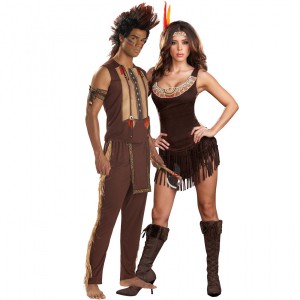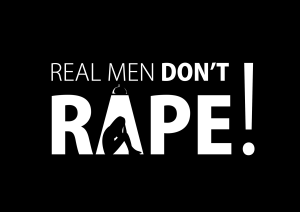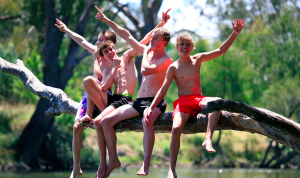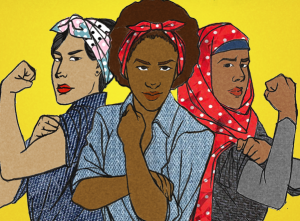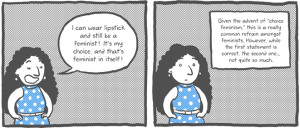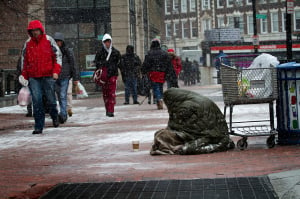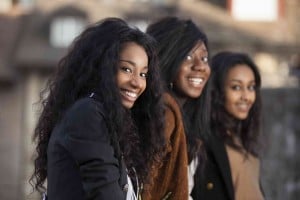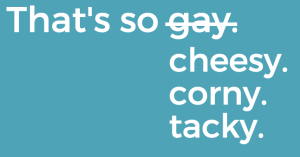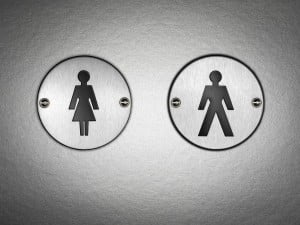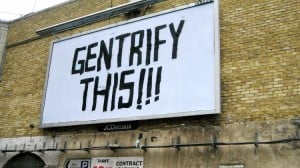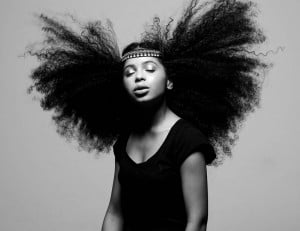Halloween is a holiday about glorifying all things spooky and scary, a day to dress up in a costume for the sake of having fun.
Unfortunately, sometimes the “fun” comes at the expense of others, and the scariest thing is how rampant racism is on Halloween.
Before you give me an eye roll and say, “Relax, it’s just a joke,” listen up. Because I used to be you.
If you’re anything like me, then you go to your nearest Halloween store and innocently pick out a costume, never with the foul intention of hurting anyone.
But regardless of whether your costume selection was done with innocent intentions or not, your costume can still perpetuate harmful stereotypes and stigmas, which then welcomes more aggressive racist attitudes.
That is: Even if you don’t think you’re vehemently racist, you can still perpetuate racism.
For example, in the past, I was a “Sexy Indian Girl” and a Geisha. I picked these costumes out because—well—I thought I’d look hot in them, and isn’t that what Halloween is all about for us ladies? (Sigh. One topic at a time.)
Why would I ever have thought about the implications that my costume would have on Native American or Asian women? Why would I think that deeply about the implications of a costume?
Well, it’s simple: Because these implications don’t affect me.
And it never occurred to me that an establishment would openly sell racist (or otherwise offensive) costumes. Why would they?
But if you’re anything like how I used to be, I have some news for you.
Racism is deeply ingrained into our history.
And “pointing out racism is not a witch hunt or an attempt to make you feel bad.” It’s done to better our society and ourselves.
Many racially, ethnically, and culturally based costumes are intended to be one of two things – humorous or erotic. Just check out which categories these costumes are listed under on costume sites: Funny and Sexy.
The question is: What about these groups of people makes them exotic or humorous?
And the simple answer is: Nothing.
But our society equates Whiteness with normalcy, and therefore everyone outside of that category is foreign, weird, or joke-worthy – perfect for a costume.
And since manufacturers don’t put much thought into how offensive costumes can be, this year let’s try asking ourselves some thought provoking questions before purchasing or making our costumes to avoid perpetuating stereotypes and racist attitudes.
1. Is Your Costume Racially, Ethnically, or Culturally Based?
If it is, then it’s probably racist.
And if you’re thinking “I don’t see race,” then consider yourself a very privileged individual who has never had the misfortune of experiencing or witnessing acts of racism.
Check your privilege.
And if you still “don’t see race,” just read the names of the costumes that you are considering purchasing. Because I assure you that manufacturers make it very clear:
- Arab Costume
- Oriental Disguise
- Mexican Serape and Hat
- Sexy Native American Girl
- Adult Dragon Lady Geisha Costume
Question why you are choosing to dress up as another culture, ethnicity, or race.
What message are you sending?
What is your intent by wearing that costume? to have a good time? to be funny? sexy?
And if so, at whose expense?
2. Do You Belong to That Group of People?
If your answer is no, remember that you can’t just borrow someone else’s culture or race for a day. It doesn’t work like that.
Perhaps unlike yourself, you don’t have to live with the stereotypes and stigmas associated with that “costume.” Because you can take it off.
But for many people, it’s not just a costume. It’s their everyday lives.
For example, you can wear an Illegal Alien costume, but you’ll never have to go through the emotional journey of the 11.7 million undocumented (not illegal) individuals in the United States. Your costume is making light of the difficult lifestyle and journey of undocumented immigrants.
“Relax, it’s not like I’m doing blackface.”
Well, I’d like to think that the majority of us understand how deeply offensive and racist it is to do something like Blackface for Halloween (or ever). But the truth is, Halloween has brought out the worst in many people:
- Florida University
- UC University
- Assemblyman in Blackface
- Colton Haynes of Teen Wolf
- Dallas Cowboy Cheerleader
I can keep going, but I think we get the point.
And the point is: Don’t be fooled.
Blackface isn’t the only thing that is racist.
Wearing a Lil’ Gangsta Hat or Ghetto Fab Wig is equally racist.
The natural hair movement rejects European beauty standards that have been force-fed on People of Color, and particularly African-Americans, for centuries.
So while you may think it’s “fun” to wear an afro or locs for Halloween, your silky straight hair will never be deemed as “unpresentable,” and you’ll never be forbidden to wear the hair that naturally grows out your head to school like seven-year-old Tiana Parker.
How will locs and afros ever be seen as “presentable” when we are making a mockery out of the hair by selling and wearing them as costumes?
By wearing cultures that aren’t yours as a costume, you are subjecting those very people to the threats associated with those stereotypes and belittling their experiences.
If you are a part of the group of people your costume is intended on representing, you can still be guilty of perpetuating a negative stereotype and opening the door to racist attitudes.
Make sure ask yourself how your costume connects to the larger issue of identity and inequality.
Are you, yourself, perpetuating a stereotype of your own race, ethnicity, or cultural background? If so, why? What are you saying with your costume?
3. Why Is Your Costume Funny or Sexy?
A harsh majority of humorous or erotic costumes are of marginalized and oppressed groups of people.
This is an action of taking advantage of people who are already in a marginalized position and continuously dehumanizing them.
When a costume’s “humor” or “sexiness” is solely based on race, ethnicity, or culture, those people’s human elements are being extracted for the sake of bringing us laughter or making us feel more “exotic.”
For example, Native Americans are one of the most underrepresented minorities in all of North America. The media has done a successful job at misrepresenting Native Americans and depicting them as only existing during Colonization and Western Expansion.
So it’s no wonder that so many individuals feel that a Native American costume can’t be offensive – because they’re non-existent!
But actually, there are 310 Indian reservations in the United States all consisting of different nations practicing different traditions.
And please don’t think that you’re paying homage to the Native American culture by wearing your mass-manufactured $29.99 costume one day out of the year.
It isn’t a sign of respect – just a lack of creativity and ignorance. There is a huge difference between cultural exchange and cultural appropriation.
Also think twice when you buy a Sexy Indian Girl costume because the fetishizing and eroticizing of Native American women doesn’t help the fact that 1 out of 3 Native women will experience rape in her lifetime.
Okay, so perhaps your costume isn’t hyper-sexualizing one group of people. But maybe your costume wins funniest costume or it’s getting the biggest laughs at the Halloween party.
Ever question why your costume is considered funny? Why are some costumes literally in the category of Funny?
As seen in the pictures of the Asian Man Costume or Mexican Man costume, light-skinned individuals are wearing the costume, a tradition I’ve seen all throughout my Halloween experiences.
Sometimes what makes a costume funny is the fact that a White individual is wearing another ethnicity or race. And let me tell you, that is straight racist.

Those ethnicities and races are not yours, so while you think it’s a funny costume, it’s other people’s lives you are wearing.
And sometimes it’s not only that someone is going outside of their race or culture for the sake of a good laugh, but it’s how exaggerated the costume (stereotype) is.
Like this Hey Amigo Mexican Costume.
When’s the last time you’ve seen an actual Mexican wearing a sombrero, pancho, and riding a donkey?
Oh right, never!
These are caricatures of people.
4. Would You Wear That Costume Around That Group of People?
If a Japanese family were to welcome you into their home, would you wear your Geisha costume? What about wearing your Arab Terrorist costume within a group of Muslim Americans?
I’m hoping that you would be at least a little hesitant to do such a thing since, ultimately, you should know that it’s disrespectful.
Halloween is not an exception.
It’s not the one day out of the year when you get to be disrespectful to others. It’s not a Get-Out-of-Cultural-Appropriation-Jail-Free Card.
It isn’t enough just to say that you’re not racist. Your actions have to reflect that, too.
Because we don’t live in a post-racial society.
—
As always, you should actively question and challenge many of our social norms, including the costumes that we deem acceptable.
Take responsibility for the messages that your costume can be sending out.
You’ll quickly realize how difficult picking out a non-offensive costume can be – which only speaks to how prevalent the problem is.
But if you’re like me and really want to stand out from the rest of your friends, then this may work in your favor.
We all know how played out many Halloween costumes can be, so challenge yourself this year.
Take this opportunity to be more creative and bring some originality to Halloween.
Last year, I used my newly cut hair to my advantage and was Mitt Romney – With His Binders Full of Women for Halloween. The best part of my costume was not only how much people loved it, but how it didn’t offend anyone!
Well—besides Mitt Romney and his binder full of misogyny—I mean women.
And if you don’t have it in you to be creative, you can always be a strip of bacon.
[do_widget id=’text-101′]
Kat Lazo is a Contributing Writer for Everyday Feminism. She’s a self-proclaimed social commentator, media critic, and overall, a woman who questions everything. Having studied Advertising and Marketing Communications at the Fashion Institute of Technology, she’s ready to add some feminism to the ad world. Check out more of her writing at TheeKatsMeoww, watch her videos on YouTube, and follow on Twitter @TheeKatsMeoww, Facebook and Tumblr. Read her articles here.
Search our 3000+ articles!
Read our articles about:
Our online racial justice training
Used by hundreds of universities, non-profits, and businesses.
Click to learn more


